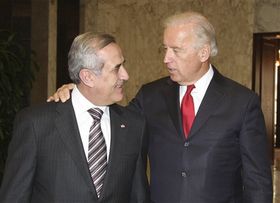By SAM F. GHATTAS, Associated Press Writer Sam F. Ghattas, Associated Press Writer – BEIRUT – The Middle East’s espionage wars are heating up after Lebanon’s arrest of more than a dozen alleged Israeli spies, and dire warnings from Jerusalem that Arab groups are trying to use the Internet to infiltrate the Jewish state.
Officials in Beirut say they struck a strategic blow against Israel with the recent arrests of 15 people — 13 Lebanese and two Palestinians — who they contend were gathering intelligence on Hezbollah positions, leaders’ movements and infrastructure targets. Iranian-backed Hezbollah militants and Israeli forces fought an inconclusive war in 2006 along the Lebanese-Israeli border and both sides have since been preparing for the possibility of another.
Although Israel and its Arab neighbors have for years spied on each other, the recent announcements have highlighted the secret war of espionage and the depth of the infiltration. Lebanese officials say the spies arrested there included a math teacher and housewife, and that they were equipped with sophisticated electronics.
Lebanon holds elections June 7 but the recent arrest announcements did not seem intended to influence the vote.







